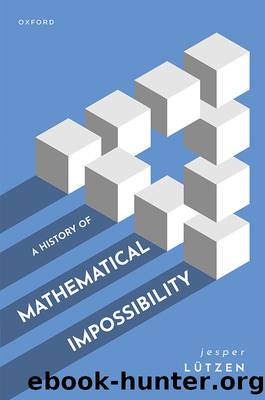A History of Mathematical Impossibility by Lützen Jesper;

Author:Lützen, Jesper; [JESPER LÜTZEN]
Language: eng
Format: epub
Publisher: Oxford University Press, Incorporated
Published: 2022-12-07T09:42:42+00:00
It is interesting that while Lagrange here stressed the utility of his work for those (including himself) who would continue the work on the resolution of the quintic, he did not even hint at its possible use in a proof of impossibility of such a solution. Indeed, when Lagrange in the last quote talks about useless attempts it is quite clear that he speaks about the attempts to find an algebraic solution, not attempts to show its impossibility. Did Lagrange consider the possibility of such a proof at all? The only hint in this direction is his remark that ânothing demonstrates its impossibilityâ (see earlier quote from Lagrange 1770â1, Oeuvres, Vol 3, 305). If this is a reference to a possible proof of impossibility it is very hidden, and not a clear indication of a fruitful direction of research. Like many earlier mathematicians, he seems to have considered the impossibility problem as a meta-mathematical question that could bar further progress in algebra, rather than as a mathematical problem that could open new vistas in this area.
While Lagrange may have been the first to contemplate that the algebraic solution of the quintic might be impossible, Gauss and Ruffini were the first to publicly announce that they believed that it was indeed impossible. In his 1799 dissertation on the fundamental theorem of algebra, Gauss stated that he strongly believed that the quintic and higher degree equations were algebraically insoluble:
After the labors of many geometers left little hope of ever arriving at the resolution of the general equation algebraically, it appears more and more likely that this resolution is impossible and contradictoryâ¦. Perhaps it will not be so difficult to prove, with all rigor, the impossibility for the fifth degree. I shall set forth my investigations of this at greater length in another place. Here it is enough to say that the general solution of equations understood in this sense [i.e., by radicals] is far from certain and this assumption [i.e., that any equation is solvable by radicals] has no validity at the present time.
(Ayoub 1980, 262â3)
Download
This site does not store any files on its server. We only index and link to content provided by other sites. Please contact the content providers to delete copyright contents if any and email us, we'll remove relevant links or contents immediately.
Understandable Statistics. Concepts and Methods by Charles Henry Brase Corrinne Pellillo Brase Jason Dolor James Seibert(162)
Meat Less: The Next Food Revolution by David Julian McClements(153)
ASTROPHYSICS FOR NON-MATHEMATICIANS by Unknown(149)
Modern Physics by Gary N. Felder and Kenny M. Felder(142)
Fundamentals of Physics I by R. Shankar;(139)
Calculus - Single and Multivariable 6th ed. by D. Hughes-Hallett(128)
Sensory Ecology, Behaviour, and Evolution by Stevens Martin;(125)
A Brief Introduction to Classical Mechanics with Illustrative Problems (181 Pages) by Shahen Hacyan(124)
The Parrot in the Mirror by Antone Martinho-Truswell(120)
Practical Math Success in 20 Minutes a Day by Mark A. McKibben(119)
A History of Mathematical Impossibility by Lützen Jesper;(119)
Iraq at the Crossroads by Toby Dodge(111)
Probabilistic Risk Analysis and Bayesian Decision Theory by Marcel van Oijen & Mark Brewer(111)
B. Everitt (ed.) Encyclopedia of Statistics in Behavioral Science by Volume-2(108)
Chemistry for the IB Diploma Third edition by Christopher Talbot Chris Davison(104)
B. Everitt (ed.) Encyclopedia of Statistics in Behavioral Science by Volume-3(103)
Flashes of Brilliance by Ronald L. Holle & Daile Zhang(102)
Ethnobotany by Jose L. Martinez(101)
Principles of Modern Chemistry by David W. Oxtoby H.P. Gillis & Laurie J. Butler(101)
